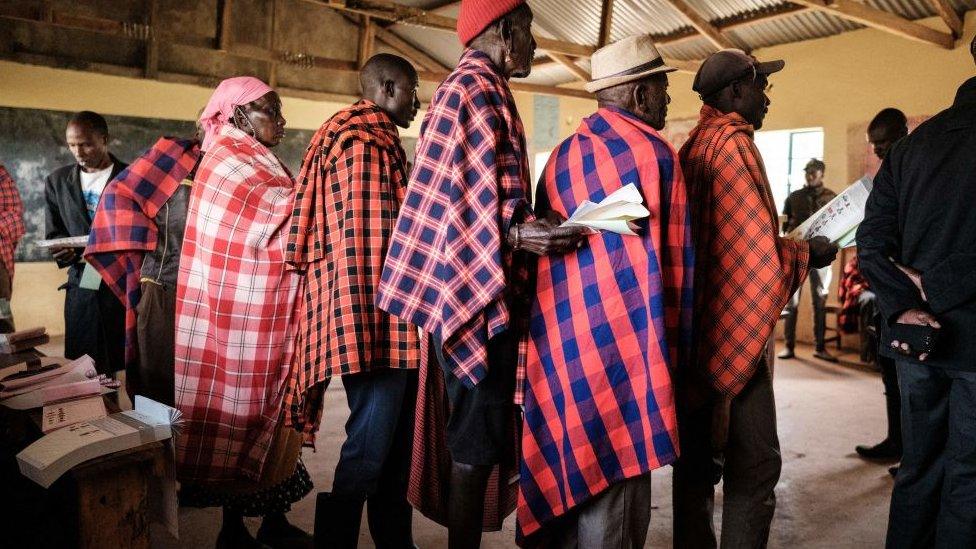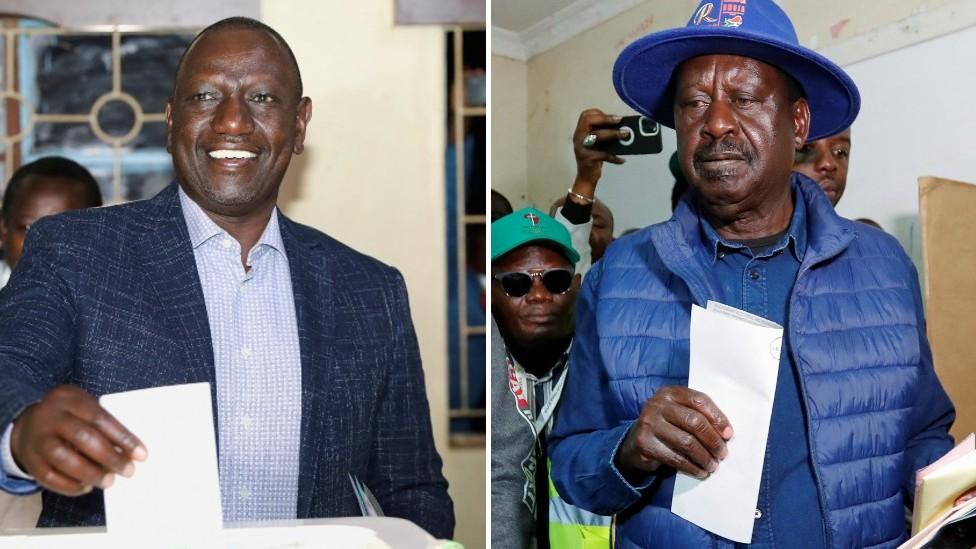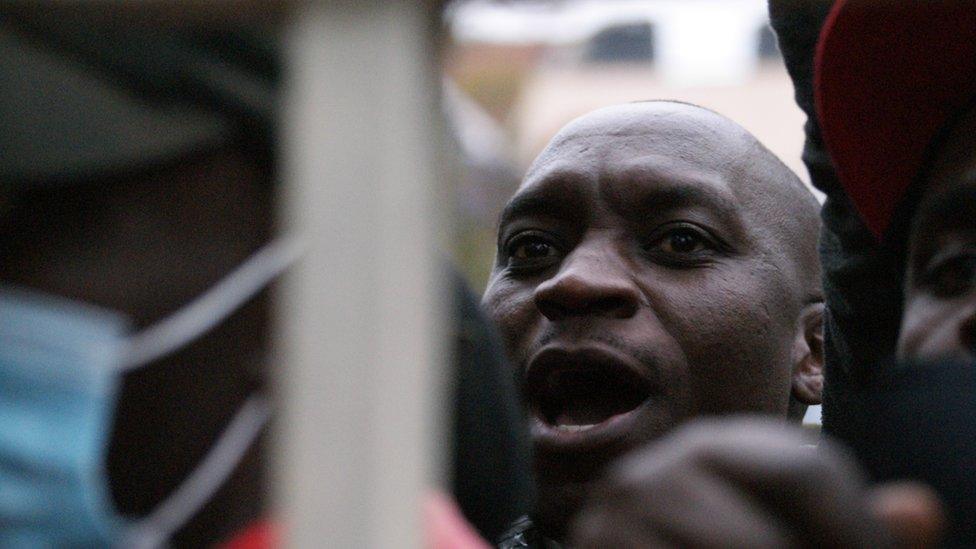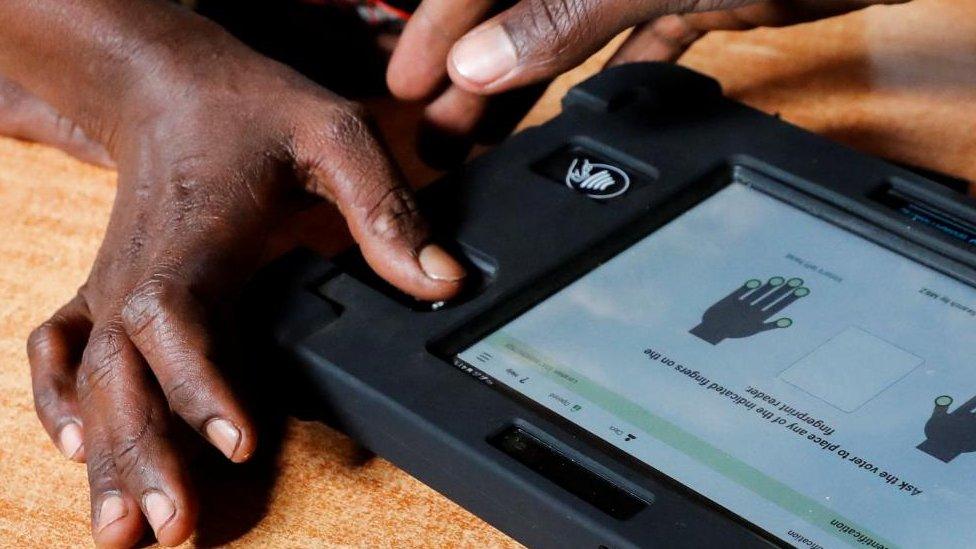Kenya Elections 2022: Raila Odinga and William Ruto in tight race for president
- Published

Voters queued since early in the morning at polling stations across Kenya
Logistical delays and a failure of the identification kit in some parts of the country marred a largely peaceful election day in Kenya.
Polls are now officially closed but voting has been extended in places which opened late.
This vote follows an intense campaign dominated by debates about living costs, unemployment and corruption.
The frontrunners for president are ex-Prime Minister Raila Odinga and current Deputy President William Ruto.
Kenyans were also electing a new parliament and local administrations.
The electoral commission is yet to announce the total turnout, but by 16:00 (13:00 GMT) - an hour before polls closed - just over 56% of the 22 million registered voters had cast their vote.
A top election official in Kenya's central region of Nyeri told journalists that turnout has been low in that part of the country compared to 2017.
The counting of votes, which takes place at the polling stations, was expected to start soon after they closed with the collation of the presidential votes a priority.
Earlier, Mr Odinga was mobbed by supporters when he went to vote in Kibra - one of his strongholds in the capital, Nairobi.
He did not speak to the press, but his wife, Ida Odinga, said he was "upbeat about the election".

Presidential candidates William Ruto (L) and Raila Odinga (R) have both voted
When Mr Ruto voted in the town of Eldoret in the Rift Valley he pledged to accept the election result.
"I think for the first time in the history of multi-party democracy in Kenya, all the candidates have undertaken that they will accept the outcome of the results," he told the BBC.
A dispute over election results in 2007 led to weeks of violence leading to the deaths of an estimated 1,200 people and forced about 600,000 people to flee from their homes
On Tuesday, there was some frustration among the early morning voters at a polling station in a primary school in the Westlands area of Nairobi.
They were blocked from entering the compound of the school for 90 minutes.

People were frustrated by delays at one polling station in the capital, Nairobi
The reason for the delay was not clear and some people started chanting: "We want to vote!"
"I was here very early. It's been disappointing that we got here early and had to wait for a long time," voter Alex Kipchoge told the BBC.
When voting did get under way, however, the process went well.
"I was quite excited. I've been waiting for this for quite a long time and I'm happy that I've actually had the chance to vote," first-time voter Abigail Awili said.
There were also delays in the coastal area of Mombasa and some parts of the north-east of the country. And in parts of Kakamega county, in the west, some electronic fingerprint scanning kits failed to work.
But the electoral commission said that nationwide only 200 broke down out of a total of more than 46,000.

Voters were identified by the thumb or finger prints
The results of the last presidential election in 2017 were annulled after the Supreme Court ruled that the electoral commission had not followed the law when it came to the electronic transmission of the vote tallies from the polling stations.
Judges ruled that "illegalities and irregularities" had taken place.
A re-run was won by Mr Kenyatta, but boycotted by Mr Odinga - the main opposition candidate at the time.
The chairman of the electoral commission, Wafula Chebukati, who was also in charge of the 2017 vote, has frequently tried to reassure Kenyans that his team will be up to the task this time.
Baba v Hustler
This election looks like it will be a tight race between frontrunners Mr Odinga, 77, and Mr Ruto, 55.
Mr Odinga - a long-serving opposition leader, nicknamed Baba ("father") by his supporters, is running for president for a fifth time. Mr Ruto, who has tried to emphasise his connection with ordinary Kenyans by calling himself a "hustler", is taking his first stab at the presidency.
Two other candidates - David Mwaure and George Wajackoya - are also in the race.
To win the presidential race in the first round, a candidate needs:
more than half of all the votes cast across the country
at least 25% of the votes cast in a minimum of 24 counties.
After counting the votes, officials will then take a photo of the final tally and send the image to both the constituency and national tallying centres.
To ensure transparency the media, political parties and civil society groups have been urged to run their own tallies using final results declared at the more than 40,000 polling stations.
But only the electoral commission can declare the winner of the presidential election after verifying the physical and digital forms sent to the national tallying centre.
It has seven days to announce the result.


